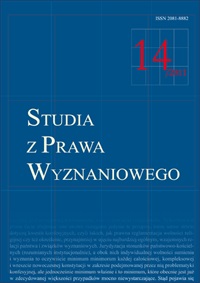Konsekwencje budżetowe pośredniego wspierania instytucji wyznaniowych ze środków publicznych w Polsce
The Budgetary Consequences of Non-Direct Support of Religious Institutions from Public Funds in Poland
Author(s): Tadeusz StanisławskiSubject(s): Law, Constitution, Jurisprudence
Published by: Katolicki Uniwersytet Lubelski Jana Pawła II - Wydział Prawa, Prawa Kanonicznego i Administracji
Keywords: religious institutions; law on religion; freedom of religion; the relations between the state, churches and other religious organizations; religious freedom; church - state relations (Poland); Churches and Religious Association
Summary/Abstract: The financing of churches and other religious associations is an important component of the system of legal and customary regulations comprising the model of Church-State relationships in modern states and being a focal point for both state and ecclesiastical administration. The most common approach is the financing of religious institutions by their own members or followers. However, due to specific social and historical processes, such a model of maintaining religious institutions has been substantially modified. Such changes have been reflected in, for instance, the state's involvement in the system of financing religious organizations. Non-direct financing occurs when the legislator rewards third parties (natural and legal persons) for the support of churches and other religious associations. In the Polish legal system, such support is mainly found in donations to ecclesiastical judicial persons and the tax reduction by 1% - the amount being transferred to designated public benefit organizations. The cited data indicates that donations do not present any significant item in the state budget revenues. The number of such donating taxpayers is around 1% of all, and the amounts donated by natural persons are between 0.02% and 0.05% of revenues from this tax; in the case of legal persons, the budgetary implications oscillate around PLN 10 million. The most controversial "unlimited" donations of legal persons are made by some 100 taxpayers, so it is possible to exercise not partial but even total control of these entities without the need to encumber tax authorities with extra auditing responsibilities.
Journal: Studia z Prawa Wyznaniowego
- Issue Year: 2011
- Issue No: 14
- Page Range: 269-282
- Page Count: 14
- Language: Polish

